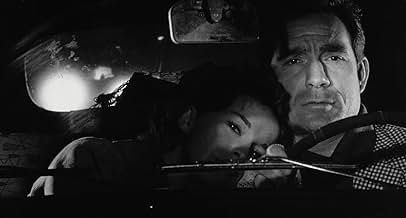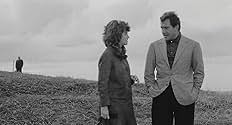Füge eine Handlung in deiner Sprache hinzuFour short films by four different directors dealing with the principles of modern life.Four short films by four different directors dealing with the principles of modern life.Four short films by four different directors dealing with the principles of modern life.
- Auszeichnungen
- 1 wins total
- Husband (segment "Il nuovo mondo")
- (as Jean Marc Bory)
- The son (segment "Il pollo ruspante")
- (as Riky Tognazzi)
- Stripteaser (segment "La ricotta")
- (Nicht genannt)
- Woman at Banquet (segment "La ricotta")
- (Nicht genannt)
- Productor's Wife (segment "La ricotta")
- (Nicht genannt)
Empfohlene Bewertungen
If IMDb is to be believed, not too many people have actually seen this film. And I have to wonder why, when it has three or four of the biggest names in Italian cinema, not to mention Orson Welles. This makes a great introduction to Italian film for those who need such an introduction. Others have compared it to "Four Rooms", which is an interesting parallel. Stylistically, the two have nothing in common, but it does have that interesting approach of four different directors creating one film...
"Illibatezza" by Roberto Rossellini. The story of an Alitalia hostess victim of what today we'd call a "stalker" who suffers from Oedipus complex. A simple, linear tale, although not immediately clear in its goal, in which the true star is the gorgeous Rosanna Schiaffino. In the American I can't help but see Rossellini's own sexual desire, probably participating in the act through his alter ego. Unfortunately Bruce Balaman (whose career counts only a couple of films) is not as captivating as the female lead, and the use of dubbing on the speaking actor makes things worse for him. It's interesting to note that Anna Maria admits to being obsessed with filming and taking pics of everything she experiences in everyday life, just like today's social networks invite us to do. This is a decisive cut from the author's Catholic phase and a change for the better, without ideological powers pressing on him. 8
"Il Nuovo Mondo" by Jean-Luc Godard. Godard never misses the chance to create something extremely unusual and destabilizing for the viewer, who is challenged to appreciate a language never before used in cinema. The short is about a possible future where an atomic bomb has been dropped near Paris and the psychological outcome this event has over the Parisiennes. The whole story is narrated in first person by the protagonist in voice over, which gives the feeling of reading a diary or a novel, except for a short dialogue between him and his lover (or, rather, "ex-lover"), whom appears to feel nothing anymore. Actually, the whole city "has changed", meaning that the fear of atomic destruction makes everyone's lives numb, with the help of some mysterious pill everybody seems to be taking. What Godard is showing us is the exact opposite of what we'd think a nuclear war would look like: apart from the screams and death of those directly hit by the bombs, everyone else would lose their interest in life, dragging a nihilistic existence, just like Alexandra does. Godard's signature features (jump cuts vs long takes) are there more than ever, with a beautiful fight between melancholy (underlined by the classical music) and raw truth (the fast cuts in the city). 8
"La ricotta" by Pier Paolo Pasolini. This is the most significant and historically important of the four films, so much that many consider this part more cinematically relevant than the whole container Ro.Go.Pa.G. Pasolini was sentenced to four months of reclusion for "contempt of the State religion", and the version we have public access to is a lot different than the original. It is a story about Stracci, a poor man working in the outskirts of Rome as an extra in a colossal about the Passion of Christ. Pasolini's message is very clear: we care more about the passion of the supposed son of God than of his sons'. Thus, while Stracci finally gets his desired meal, the saints in the movie laugh at him and cause his end. On the other hand, the characters of the director (Orson Welles!) and the journalist give out Pasolini's view of society, with the middle man being a "monstruosity" who doesn't understand deep thoughts but only his stupid, futile desires (like the dog). The film manages to be funny and extremely tragic at the same time, and the dycotomy between black-and-white actual world and colored fiction (and also between twist and classical music) explain through sensory experience the gap between reality and what show business wants us to believe. 9
"Il pollo ruspante" by Ugo Gregoretti. Of the four, "Il pollo ruspante" is the least interesting short. It is a critique of post-war Italian society, after the economic boom that made the nation and its inhabitants much richer and caused the birth of a larger middle-class. The events are narrated through a commerce professor who speaks using a laryngophone (which somewhat dehumanizes him) and lived by a family of four led by the greatly funny Ugo Tognazzi. Although it has some smart moments, the message underlying lies too much on the surface, making it so explicit that becomes bothering, especially when the customers at the restaurant literally become battery-bred chicken. While the other directors managed to make their films secretly full of meaning, Gregoretti tries way too hard to make everyone in the audience understand everything. Still, Tognazzi is always a delight to watch, and the situations are too surreal to plainly hate them. 7
Overall rating: 8
The other short films by Rossellini, Godard and one more are not bad but very mediocre, Rossellini's attempt at some comedy is not altogether funny, Godard's attempt at some philosophical science fiction is far-fetched and unrealistic but will provide food for thought, while the last item is a terribly revolting satire. All four films are satirical, but Pasolini's is at least funny.
Pasolini's film is worth 10 points, Rossellini's snd Godard's 7, the last one only 4.
Wusstest du schon
- WissenswertesOrson Welles' voice was dubbed into Italian by another actor.
- PatzerIn the segment "La ricotta," Orson Welles is directing a "re-enactment" of the Crucifixion. It shows Jesus lying on top of a cross, tied down, while 4 men carry Christ and his cross up a hill. According to the Stations of the Cross, Christ carried his own cross.
- Zitate
The Journalist (segment "La ricotta"): I hope I'm not disturbing. I'm a journalist. I'd like to get a little interview.
The 'Director' (segment "La ricotta"): No more than 4 questions.
The Journalist (segment "La ricotta"): Thank you. First, what do you mean to express with this new work?
The 'Director' (segment "La ricotta"): My intimate, profound archaic Catholicism.
The Journalist (segment "La ricotta"): Second, what do you think of Italian society?
The 'Director' (segment "La ricotta"): The most illiterate masses, and the most ignorant bourgeoisie in Europe.
The Journalist (segment "La ricotta"): And third, what do you think of death?
The 'Director' (segment "La ricotta"): As a Marxist, I never give it any thought.
The Journalist (segment "La ricotta"): Fourth and last question: What do you think of our great director Federico Fellini?
The 'Director' (segment "La ricotta"): He dances.
- Alternative VersionenThe Portuguese subtitled version was shown with episodes in a different order: first Frango no Campo / "Pollo rumpante, Il"; then O Novo Mundo / "Nuovo mondo, Il"; and last "Pureza" / "Illibatezza". Pasolini's episode was totally cut by the scissors of official censorship in the theatrical release.
- SoundtracksRicotta Twist
by Carlo Rustichelli
Top-Auswahl
- How long is Ro.Go.Pa.G.?Powered by Alexa
Details
- Laufzeit2 Stunden 2 Minuten
- Farbe
- Sound-Mix
- Seitenverhältnis
- 1.85 : 1
Zu dieser Seite beitragen




































